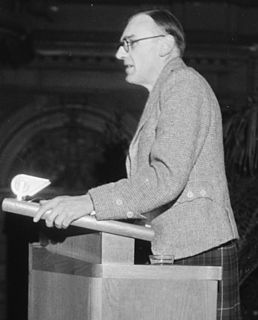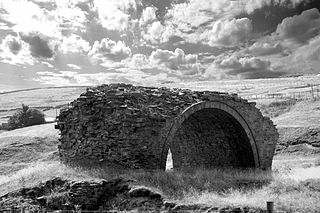This article needs additional citations for verification .(April 2016) (Learn how and when to remove this template message) |
Paid on Both Sides: A Charade was the first dramatic work written by W. H. Auden. It was written in 1928 and published in 1930. It was performed in New York in 1931 and then at the Cambridge Festival Theatre on 12 February 1934 (seven months after Terence Gray departed) in a programme of "experiments conducted by Joseph Gordon Macleod" which also included Deirdre by W.B.Yeats and An Animation of a Lay of Horatius Cocles by Thomas Babington, Lord Macaulay.

Wystan Hugh Auden was an English-American poet. Auden's poetry was noted for its stylistic and technical achievement, its engagement with politics, morals, love, and religion, and its variety in tone, form and content. He is best known for love poems such as "Funeral Blues"; poems on political and social themes such as "September 1, 1939" and "The Shield of Achilles"; poems on cultural and psychological themes such as The Age of Anxiety; and poems on religious themes such as "For the Time Being" and "Horae Canonicae".

Joseph Todd Gordon Macleod (1903–1984) was a British poet, actor, playwright, theatre director, theatre historian and BBC newsreader. He also published poetry under the pseudonym Adam Drinan.
For the Auden "charade" the actors in Cambridge were seated on chairs on both sides of the stage. The "actors" were Flavia du Pre, David Raven, Noel Iliff, Sanchia Robertson, Peter Hoar, Robert MacDermot, Don Gemmell, Else Bley, John Hamilton, David Marsh, John Izon, Clephan Bell, Garrett Jones, Diana Morgan, Cicely Nicks and Macleod as the "Chorus". The theatre programme described the content: "Two families (or classes or industries or nations) are at feud. The Lintzgarth side marries into the Nattrass side; but at the wedding the Nattrass mother, in revenge for the death of her elder son, incites her younger son to shoot the Lintzgarth bridegroom; and the peace and mutual toleration that had been promised are ruined by personal animosity." Lintzgarth and Nattrass [1] are real places which Auden found in his exploration of the North Pennines and Alston Moor. The former is a house at Rookhope, the latter at Alston. The latter is also a family surname in the area. [2]

Alston Moor is a civil parish, also electoral ward in Cumbria, England, based around the small town of Alston. It is set in the moorlands of the North Pennines, mostly at an altitude of over 1000 feet. The parish/ward had a population of 2,088 at the 2011 census. As well as the town of Alston, the parish includes the villages of Garrigill and Nenthead, along with the hamlets of Nenthall, Nentsberry, Galligill, Blagill, Ashgill, Leadgate, Bayles and Raise. Alston Moor is part of the North Pennines Area of Outstanding Natural Beauty (AONB), the second largest of the 40 AONBs in England and Wales.

Rookhope is a village in County Durham, in England. A former lead and fluorspar mining community, it first existed as a group of cattle farms in the 13th Century. It is situated in the Pennines to the north of Weardale. W. H. Auden once called Rookhope 'the most wonderfully desolate of all the dales'. In the 2001 census Rookhope had a population of 267. The village pub, the Rookhope Inn and the Swallow's Rest on the fell surrounding Rookhope are popular with cyclists on the coast to coast cycling route which runs from Sunderland on the east coast to Whitehaven on the west coast of northern England.
Paid on Both Sides is a brief dramatic work that combines elements of Icelandic sagas, modern psychoanalysis, and English public-school culture. Auden wrote it in two versions, a brief first version written in mid-1928 that was published after his death, and a longer version, written later in the year, that was first published in The Criterion in 1930 (Auden's first publication outside of school and university magazines) and again in his 1930 volume of Poems .
The Criterion was a British literary magazine published from October 1922 to January 1939. The Criterion was, for most of its run, a quarterly journal, although for a period in 1927–28 it was published monthly. It was created by the poet, dramatist, and literary critic T. S. Eliot who served as its editor for its entire run.

Poems is the title of three separate collections of the early poetry of W. H. Auden. Auden refused to title his early work because he wanted the reader to confront the poetry itself. Consequently, his first book was called simply Poems when it was printed by his friend and fellow poet Stephen Spender in 1928; he used the same title for the very different book published by Faber & Faber in 1930, and by Random House in 1934.
The play is dedicated to Cecil Day-Lewis.








